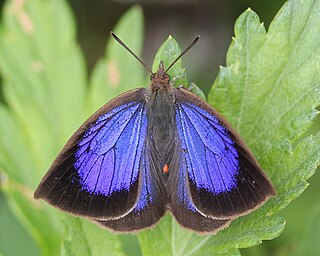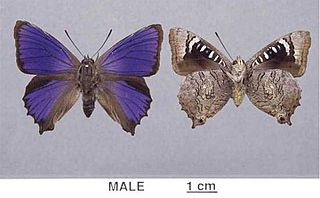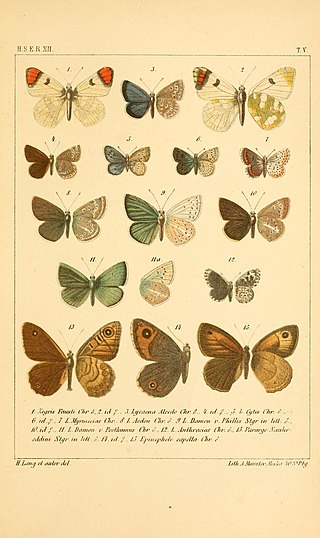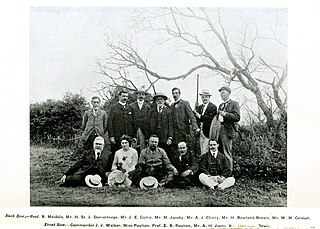This article relies largely or entirely on a single source .(July 2024) |
| Radissima | |
|---|---|
| Scientific classification | |
| Kingdom: | |
| Phylum: | |
| Class: | |
| Order: | |
| Family: | |
| Genus: | Radissima |
Radissima is a genus of butterflies in the family Lycaenidae. [1]
This article relies largely or entirely on a single source .(July 2024) |
| Radissima | |
|---|---|
| Scientific classification | |
| Kingdom: | |
| Phylum: | |
| Class: | |
| Order: | |
| Family: | |
| Genus: | Radissima |
Radissima is a genus of butterflies in the family Lycaenidae. [1]

The superfamily Papilionoidea contains all the butterflies except for the moth-like Hedyloidea.
Zulu may refer to:

Lycaenidae is the second-largest family of butterflies, with over 6,000 species worldwide, whose members are also called gossamer-winged butterflies. They constitute about 30% of the known butterfly species.

Riodinidae is the family of metalmark butterflies. The common name "metalmarks" refers to the small, metallic-looking spots commonly found on their wings. The 1,532 species are placed in 146 genera. Although mostly Neotropical in distribution, the family is also represented both in the Nearctic, Palearctic, Australasian (Dicallaneura), Afrotropic, and Indomalayan realms.

Miletus is a genus of butterflies sometimes called brownies. Its species are found in the eastern Palearctic realm and the Indomalayan realm, and some stray east of the Wallace Line. The genus was erected by Jacob Hübner around 1819. Miletus is the type genus of the subfamily Miletinae.

Allotinus is a genus of butterflies in the family Lycaenidae. The genus was erected by Cajetan Felder and Rudolf Felder in 1865. The members (species) of this genus are found in the Indomalayan realm.

Arhopala is a very large genus of gossamer-winged butterflies (Lycaenidae). They are the type genus of the tribe Arhopalini. In the relatively wide circumscription used here, it contains over 200 species collectively known as oakblues. They occur from Japan throughout temperate to tropical Asia south and east of the Himalayas to Australia and the Solomon Islands of Melanesia. Like many of their relatives, their caterpillars are attended and protected by ants (myrmecophily). Sexual dichromatism is often prominent in adult oakblues.

Amblypodia is a genus of butterflies in the family Lycaenidae. Several species formerly placed here are now in Arhopala and Flos, although this placement is not necessarily definite.

Iolana is a Palearctic genus of butterfly in the family Lycaenidae.

Lachnocnema, commonly called woolly legs, is a genus of butterflies in the family Lycaenidae found mainly in Sub-Saharan Africa. Identification requires dissection to reveal subtle genital distinctions.

Leptotes is a butterfly genus in the family Lycaenidae. They are commonly known as zebra blues in reference to their zebra-striped undersides.

George Thomas Bethune-Baker was an English entomologist who specialised in Lepidoptera, especially those in the family Lycaenidae of butterflies.

Oenomaus is a genus of butterflies in the family Lycaenidae. The species of this genus are found in the Neotropical realm.

Ogyris is an Australasian genus of butterflies in the family Lycaenidae.

Philiris is a genus of butterflies in the family Lycaenidae. The species of this genus are found in the Australasian realm, mostly inhabiting tropical rainforests. Philiris was erected by Julius Röber in 1891. It is a speciose genus. Tite decided on 56 species. Sands added 11 species and placed the taxa into 21 species groups. Most species are on New Guinea. Tite considered Philiris and Candalides Hübner, 1819 to be sisters. Eliot (1973) placed Philiris in Luciini Waterhouse & Lyell, 1914, close to Hypochrysops C. et R. Felder, 1860. Compared to other members of the tribe, Philiris have relatively uniform ventral patterns with usually silvery-white ground color.
Subsolanoides is a genus of butterflies in the family Lycaenidae. It is a monotypic genus, containing the single species Subsolanoides nagata, which is endemic to China.

Turanana is a genus of butterflies in the family Lycaenidae. It is found in the east Palearctic from Greece to Central Asia.

Hamilton Herbert Charles James Druce was an English entomologist who specialised in Lycaenidae and to a lesser extent Hesperiidae. He is not to be confused with his father, the English entomologist Herbert Druce (1846–1913) who also worked on Lepidoptera.

Thermozephyrus ataxus, the wonderful hairstreak, is a small butterfly found from India to Japan that belongs to the lycaenids or blues family.

Styx is a monotypic genus of butterflies in the metalmark family Riodinidae. It consists of one species, Styx infernalis, described by Otto Staudinger in 1875. It is endemic to Peru, where it inhabits tropical montane cloud forests between the elevations of 1000-1600 meters.